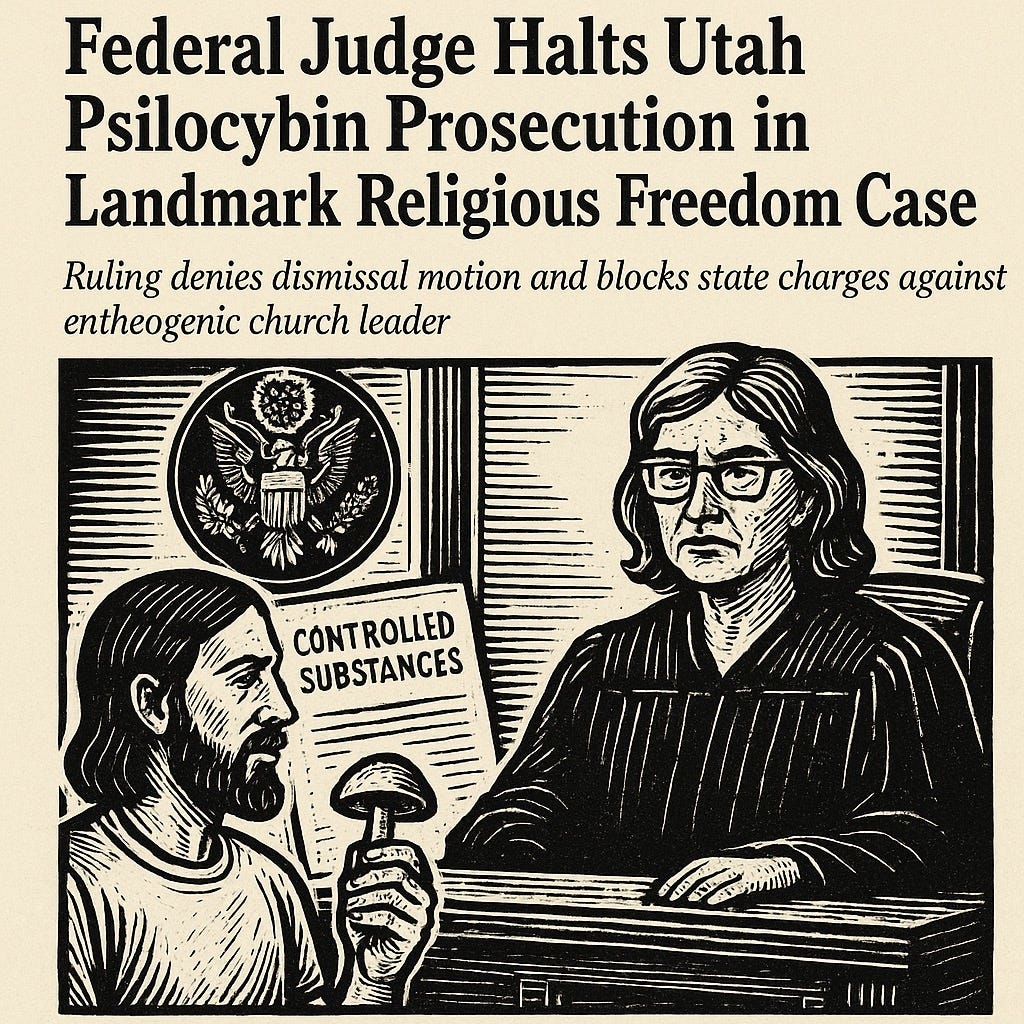Ruling denies dismissal motion and blocks state charges against entheogenic church leader
On August 4, 2025, U.S. District Judge Jill N. Parrish ruled in favor of a Utah-based entheogenic church, denying state and city officials’ motion to dismiss and issuing an anti-suit injunction that blocks the state’s ongoing criminal prosecution against its founder.
The decision is a major procedural win for Bridger Lee Jensen and his organization Singularism, which uses psilocybin as part of its religious ceremonies. The court held that Utah’s Controlled Substances Act likely violates both federal and state constitutional protections, as well as the newly enacted Utah Religious Freedom Restoration Act (RFRA), by failing to accommodate religious uses of psilocybin while permitting certain secular uses.
Jensen and his co-plaintiffs originally filed suit after law enforcement raided their spiritual center in Provo, seizing sacramental psilocybin and arresting Jensen. State prosecutors then filed criminal charges for drug possession. But the federal court’s injunction now prohibits further proceedings in the state criminal case, pending resolution of the federal lawsuit.
The ruling focuses on two legal pillars: the Free Exercise Clause of the U.S. Constitution and Utah’s RFRA. Judge Parrish concluded that Utah’s law is not “generally applicable” because it permits psilocybin use in healthcare settings but not for religious rituals, thereby triggering strict scrutiny. She further found that the state failed to show how denying a religious exemption advanced its interests more effectively than allowing medical exceptions.
The court emphasized that banning plaintiffs’ sacramental use while permitting secular behavioral-health treatment constituted uneven treatment between religion and non-religion. “A religious exemption for Plaintiffs would not necessarily undermine the government’s interest any more than the secular exemption does,” Parrish wrote, citing precedent from Fulton v. City of Philadelphia.
Defendants argued the federal court should abstain from interfering with the state prosecution under the Younger abstention doctrine, which ordinarily prohibits federal courts from enjoining state criminal proceedings. But Judge Parrish ruled that the doctrine did not apply. The court found that by removing the civil case to federal court and later initiating criminal charges, the government effectively waived the abstention defense and acted in bad faith.
The opinion sharply criticized the state’s conduct, finding that the prosecution was filed “to harass Plaintiffs into ceasing their sincere religious practices” and potentially to secure a more favorable outcome than in federal court. The court noted that the prosecution had already damaged the church’s ability to maintain its religious community and activities.
Because of this, the injunction bars state authorities from continuing the prosecution of Jensen for psilocybin possession. However, the court declined to enjoin state charges related to THC, noting that Jensen had not raised specific arguments about cannabis under federal or state religious freedom laws.
The case remains ongoing, with final judgment yet to be entered. Judge Parrish’s order temporarily halts all state court proceedings against Jensen under the psilocybin statute but does not resolve the ultimate merits of the religious freedom claims. A full trial or summary judgment ruling is expected in the coming months.
This article was prepared with the assistance of AI based on publicly available court documents.
Case dicumebt
